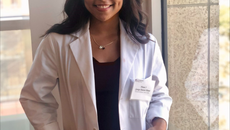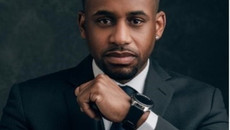Alex Arroyo, MD (SFC '98); Director, Pediatric Emergency Medicine, Maimonides Medical Center

As an emergency physician at Maimonides Medical Center in Borough Park, one of Brooklyn's busiest emergency rooms, Dr. Alex Arroyo is on the front lines of the COVID-19 pandemic.
Dr. Arroyo oversees Maimonides' pediatric emergency practice, but when the number of adults sick with COVID put extreme demands on medical resources at his hospital's ER, he and his pediatric colleagues shifted gears to support those patients too. As of April 15th, 80 percent of the hospital was dedicated to caring for the 600 COVID-19 patients there.
COVID-19 not only impacted Dr. Arroyo's work but hit him much closer to home. Along with his wife – also an ER doctor – three young children, mother, father and two aunts, Dr. Arroyo became infected with COVID-19 in March at, he believes, a family birthday party. He and his family are now recovered, including one aunt who was on a ventilator and dialysis due to the infection, and his parents and other aunt who all required hospitalization.
Dr. Arroyo began his medical career as a biology major at St. Francis College, before heading to the University of Connecticut for medical school. He recently shared his perspective on working in the current pandemic and his St. Francis College career.
How has handling the COVID-19 pandemic been for you and your colleagues?
Let me go back to pre-COVID. I work in the pediatric emergency department of a large medical center in Brooklyn, Maimonides Medical Center. We see about 120,000 visits a year, with almost 40,000 of those being in the pediatric emergency department. On the adult side, my colleagues see about 300 patients a day.
Typically, in the emergency department you have a variety of patients come in. You'll get an ankle sprain. You'll get chest pain that's a heart attack. You'll get head injuries or broken fingers. You'll get difficulty breathing from asthma or allergic reactions.
A lot of that stuff went away [with the start of COVID]. The volume of patients went up slightly for the adult side, but the acuity of the patients -- meaning how sick they were -- just shot through the roof.
The majority of people coming in had COVID and were very sick from it. They were respiratory patients who had difficulty breathing or had pneumonia. The patients were very, very, very complex [to treat]. and once you increase the level of complexity, your time gets [taxed] a lot more.
How did you manage on the pediatric side?
The interesting thing about the whole coronavirus situation is that it hasn't given [the pediatric population] the disease that we've seen in the adult population.
So as the pandemic progressed, [the adult emergency doctors] were getting busier and busier and needed more manpower.
The pediatric doctors - now mind you, all of them are pediatricians that do pediatric emergency medicine as a specialty -- decided to see patients up to age 39, which increased to age 49 pretty quickly thereafter.
I was proud that my staff really had no qualms about seeing these adult patients.
Did the COVID pandemic steel your resolve to serve?
At the very beginning, we're all kind of like, "oh man, this will be bad." And then we met with each other and made this decision: whatever we needed to do to deal with things, we just had to deal with it. We'll do whatever we needed to do, because that's what the situation called for. It terrified everyone at first, but it also strengthened our resolve.
Emergency room doctors are headstrong. We're ready for anything, at any point, at any time. It's something that we pride ourselves on.
On the medical side, what has the pandemic taught you?
The coronavirus has been fascinating as to how it's affecting patients, what it does to physiology and how we have to treat it.
Coronavirus has been this amorphous disease that doesn't fit into any specific algorithm that we've seen for viruses or for disease processes. It can present in a myriad of different ways. It's really made us go back to the drawing board as doctors. It's made us think outside the box and do things that we normally wouldn't do for patients.
We're still learning. We have a bunch of trials in my hospital that are active right now, different medications and different ways of ventilating these patients. From a pure science perspective, it's been extremely eye-opening.
Let's go back in your life. How did you make your way to St. Francis College?
I'm a local boy. I was born in Brooklyn. When I was looking around for colleges, a few caught my eye, but none of them had the feel that I wanted, aside from St. Francis. It was an easy choice because I wanted to stay home. I went to Bishop Ford [Central Catholic High School in Windsor Terrace, Brooklyn, which closed in 2014]. It was a similar environment to St. Francis.
Did you start college knowing you would become a doctor?
The one person who has been the driving force in all my life has been my mother. Since I learned how to write cursive, she looked at my papers and told me that there's only one profession that I could ever go into and that's medicine because my handwriting was terrible.
All joking aside, the seed was planted in my head very, very early in my life by my mom. I'm also a big science nerd, so those two things intertwined. I wanted to head down that path [towards becoming a doctor] prior to coming to St. Francis.
Any professor stand out to your success at St. Francis College?
Kathleen Nolan [Professor of Biology] was instrumental. She would always push us -- me specifically -- to see what I wanted to do and to go do that, regardless of what anybody else said.
Looking back to your St. Francis College experience: do Franciscan values – particularly the value of serving others -- factor into the work you do now?
Medicine, in general, is a service industry. People don't view it as that way, but as a physician you are here to serve the patient. There are few places in the world that serve as much and as often as in the hospital emergency department.
[In the ER], we are open to all walks of life. I don't check anybody's insurance papers. It's just not my job. I'm going to take care of you no matter what. I'm going to treat you whether you are homeless, whether you live in a shelter, or whether you have a $30 million brownstone in the heart of downtown Brooklyn. You're going to get the same exact care from me, whether you're rich or poor. I think that's something that is definitely true to Franciscan values.

